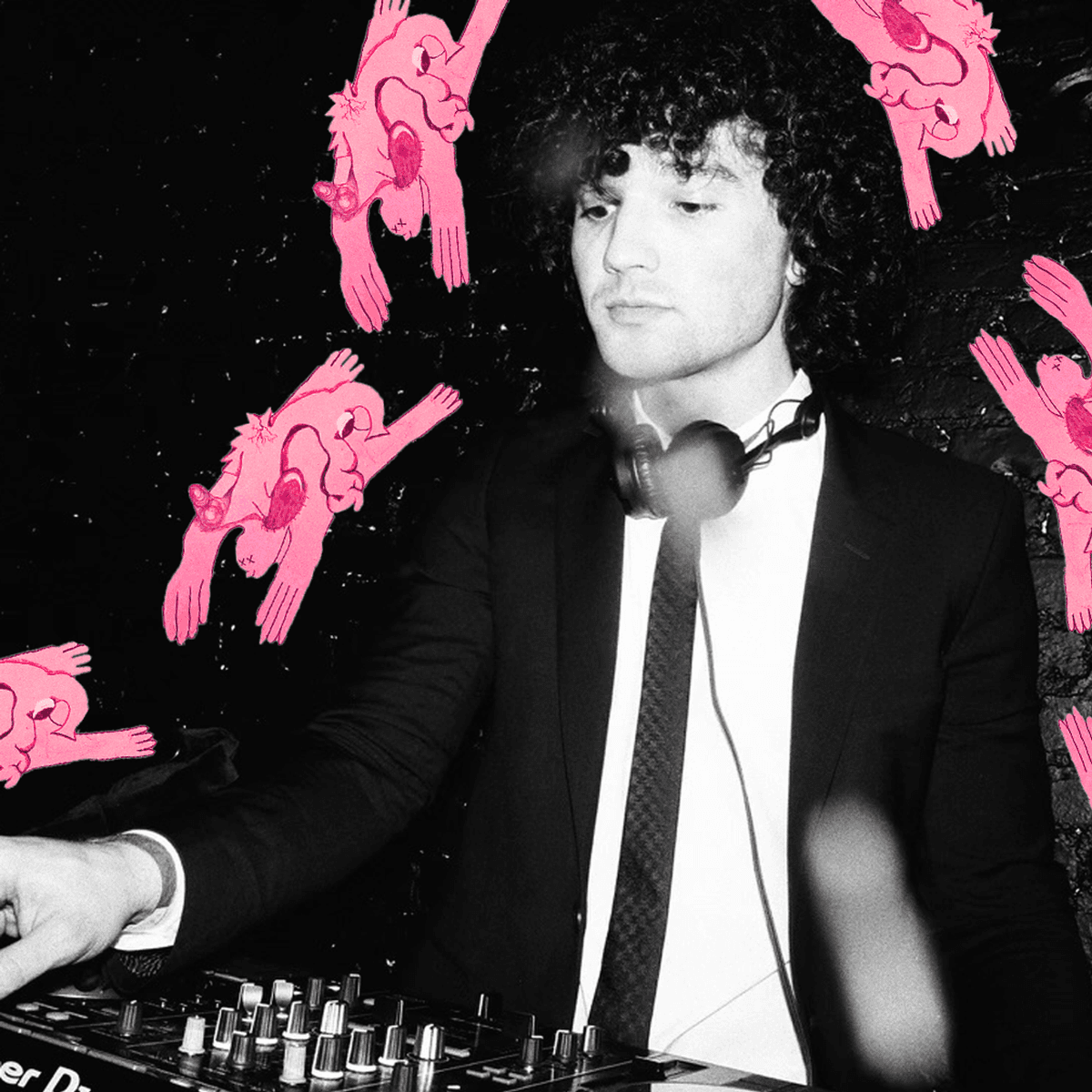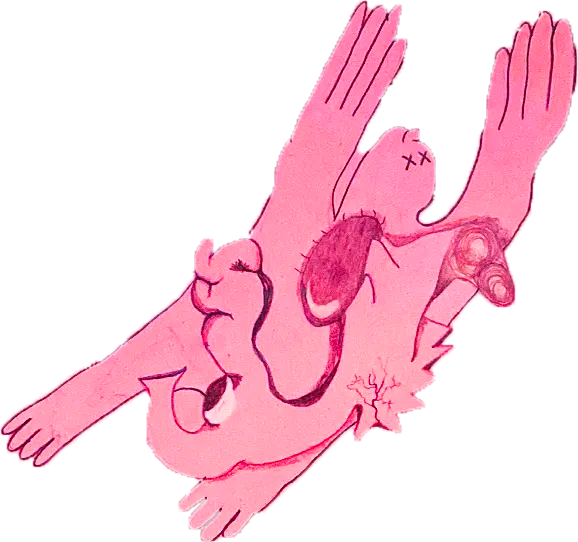SALAMANDER DAYS
KJ Rothweiler

I find being an adult really boring, unsentimental, and uncinematic. Rebekah and I have always wanted to make movies about adolescence: how tiny emotional moments in your teenage years can feel large…about how your world can feel big even when it’s a lot smaller.
TESS POLLOK: You wear a lot of hats–independent filmmaker, musician, podcaster. Do you want to start with how you got started on Ion Pod?
KJ ROTHWEILER: It was a pandemic weirdo thing; [Curtis Pawley] and I started it as an anonymous meme account and nobody knew who ran it. Someone suggested we turn it into a podcast and one night we were bored enough to do it. We talked until, like, five in the morning on the phone–because he went home during the pandemic–and then, yeah, we recorded the first episode. We pitched our voices down so no one would know who we were. We were embarrassed at first, but people really liked it, so we kept going, and now it is what it is.
POLLOK: How did you and Curtis meet?
ROTHWEILER: We met in high school. I recruited him to be in my band. That’s important to me–another interview we did mistranscribed that I was in his band. I can finally set the record straight now. He was in my band.
POLLOK: [Laughs] I’ll make sure to get that detail down. The podcast is about film, right? I want to get it across to people who aren’t familiar with Ion Pod that it’s memes, shitposting, and podcasting about the indie film world, essentially.
ROTHWEILER: Yeah, I mean, I’m from a music background. I come from a musician’s world and so does Curtis. We saw the independent film scene in New York and everyone seemed really miserable and humorless. I feel like musicians are pretty good at making fun of themselves, generally, or at least they can take a joke in a way that film people can’t. So we just thought it was funny to poke fun at all of these super self-serious film people. It ended up endearing us to a lot of people, which was cool.
POLLOK: What do you play?
ROTHWEILER: Guitar, piano. For most of my 20s I made ambient music that was software-based. But I’m really burnt out right now, creatively speaking, I’m on my way to the desert. I’m going to Joshua Tree with my brother.
POLLOK: Oh, I’m from LA. That sounds so fantastic. I’m jealous of you now. Why are you going out there?
ROTHWEILER: I just haven’t seen my brother in a long time. He’s been wanting to take this trip with me for years and I’ve been ignoring him. We screened our new movie, Salamander Days, out in LA, and I realized I didn’t hang out with him at all–I was like, “Who am I becoming?” So I agreed to this trip. Things have been really overwhelming recently so I’m happy to do it.
POLLOK: I go camping with my dad once a year. It’s significant. We go to Montana and drink a lot of huckleberry wine and eat elk bratwurst.
ROTHWEILER: Oh, elk. I love that. I went on a road trip with Rebekah [Sherman-Myntii] and we drove back and forth across the country. It was one of my favorite trips.
POLLOK: Yeah, I drove home to LA from Sarah Lawrence and it was one of the best experiences I ever had.
ROTHWEILER: New York doesn’t always allow me the creative space I need to think and make the things I want to make, that’s why I’m so excited to go on a trip. I just love that stuff in general. I had writer’s block for a while after finishing Salamander Days but I got hit with a big lightning bolt of inspiration right after I left New York, right after our first screening in LA. I think it gives me a window of space to delve into new ideas I’m having and make headway on them.
POLLOK: How specifically do you want to talk about Salamander Days? I know it isn’t out yet, but I’m curious about the themes and ideas behind it. What inspires you?
ROTHWEILER: Rebekah and I have always wanted to make movies about our adolescence. I find being an adult really boring, unsentimental, and uncinematic. We both had the same desire to make a movie about the high school experience: losing friendships, losing people, how tiny emotional moments in your teenage years can feel large. It’s about teenage consciousness and how different it is from adult consciousness. It’s also about how your world can feel big even when it’s a lot smaller. It’s a very abstract, experiential movie; it’s almost not worth talking about the plot.
POLLOK: It’s execution-driven. You know that phrase?
ROTHWEILER: No, tell me about it.
POLLOK: That’s something I picked up in LA growing up around the film industry. When people couldn’t sell their movie based on the narrative they would say it was “execution-driven.” Meaning it’s just about the feeling it gives you.
ROTHWEILER: I’ve never heard that. I have to try that out.
POLLOK: Yeah, feel free to use that anytime you want.
ROTHWEILER: Well, it’s funny you say that, because I made ambient music for a really long time and I think it’s because I’m drawn to stuff that is–I don’t know. I used to listen to film scores when I was younger and music that didn’t have any lyrics. I was always drawn to instrumentals. I’m drawn to feeling that isn’t bogged down by language. There isn’t even a lot of dialogue in our movie. It’s a very ambient movie; I like being brought places without language. I appreciate books and I know you work a lot with literature, but I like how cinema and music can operate outside those boundaries.
POLLOK: Of course, people connect with things in different ways. I never thought that meant you hated books. [Laughs]
ROTHWEILER: I have a really hard time doing something like sitting down to write a script. Iif a movie can use sound design and editing to create a series of images that are meaningful–that language just connects with me more. But obviously the tradition of cinema is rooted in theater and in playwrights–there’s more than one way of looking at the medium.
POLLOK: So you’re interested in work that’s not narratively driven. Did you see La Région Centrale at the Museum of the Moving Image earlier this year? The Michael Snow movie. It’s non-narrative, bizarrely unsentimental but entirely emotionally driven. I think Chantal Akerman once watched it several times in a day and said it changed her life. Seems up your alley.
ROTHWEILER: Yeah, I love all that shit. I used to be really into experimental film. I’m actually now on the board of the Filmmakers Co-Op, which is the biggest archive of avant-garde film in New York City. The stuff that I’m really drawn to, again, exists on the border of narrative and experimental. I love late Terrence Malick movies. Everything that came after Tree of Life is really interesting to me. I felt like at the beginning of his career he was more focused on traditional narratives, like Badlands, and with Tree of Life he was breaking into a mode of filmmaking that was more lyrical and impressionistic. Now his movies are full of poetic impressionism that cares very little about the story. I’m obsessed with his new movie Knight of Cups. It’s Christian Bale and Natalie Portman, so it’s, like, Hollywood arthouse, but again, there’s very little dialogue and it’s very interior–I just love shit like that.
POLLOK: Do you like a lot of the arthouse movies that have been coming out? What are some other inspirations for you?
ROTHWEILER: I love Gus van Sant’s “Death Trilogy,” which is Gerry, Elephant, and Last Days. Have you seen any of those? I also love Chantal Akerman’s movies.
POLLOK: No, I haven’t. I’m not a big film head, unfortunately, but I like talking with filmmakers. You guys are usually pretty easy to talk to. I noticed that Salamander Days keeps popping up at different independent venues, but never on the festival circuit. What made you want to operate outside the festival system?
ROTHWEILER: There’s kind of two reasons we didn’t go that route. Number one is that we sold out one screening in LA and two in New York City. If we showed it at festivals, they would just sell out because of the hype around the festivals, and we’d be a small fish in a very big pond there. Doing it this way makes us feel like the main event, which is better from a branding perspective. The other reason is that it’s a financial thing. Again, showing it at a major festival, everybody who wants to see the movie would just see it there, and then the festival would get to keep all that money. We were saving money for five years to make this, so it doesn’t make sense for us to do that. Speaking as an indie filmmaker who’s trying to make a career out of this, it doesn’t work financially unless I’m cutting a deal with a box office at an actual theater. Until a real distributor offers to buy the movie, I want to make money off the ticket sales.
POLLOK: I didn’t know that about the festival system! You guys don’t get any of the ticket sales?
ROTHWEILER: No. You make no money off of it at all. In some cases you have to spend a lot of money to get in, also.
POLLOK: We interviewed Betsey Brown about her debut indie film Actors and she did it that way–outside the festival circuit–and seems to have been really successful with it.
ROTHWEILER: Honestly, Betsey inspired a lot of this. We were following in her footsteps. She’s what personally gave us the will to do this.
POLLOK: You’re a part of the Betsey-Indie Industrial Complex. The Betsey-to-Indie Pipeline.
ROTHWEILER: Exactly. I feel like Betsey created this model. When we saw what she was doing with Actors, combined with the fact that I have a vague relationship with the Roxy Cinema, we knew exactly what we wanted to do with our movie. I think another great thing about the podcast is that we’ve built up an audience over the past few years to launch projects like this. So far, all of our screenings have sold out.
POLLOK: I feel like the energy at indie screenings is a lot better, too. The audience is more engaged. A lot of the people at film festivals are executives, industry shills, etc., who are totally fried and uninvested in what they’re watching. It’s a more emotionally palpable experience to go to a packed screening with hundreds of people who are intensely connected and really want to watch the movie.
ROTHWEILER: Exactly. Exactly. This is what you set out to do as a filmmaker. If people are paying the ticket price to see it and loving it, you’ve done your job.
KJ Rothweiler is a musician, podcaster, and independent filmmaker based in New York City. He is one half of the podcast The Ion Pack and recently directed his first feature film, Salamander Days.
Tess Pollok is a writer and the editor-in-chief of Animal Blood.
← back to features
